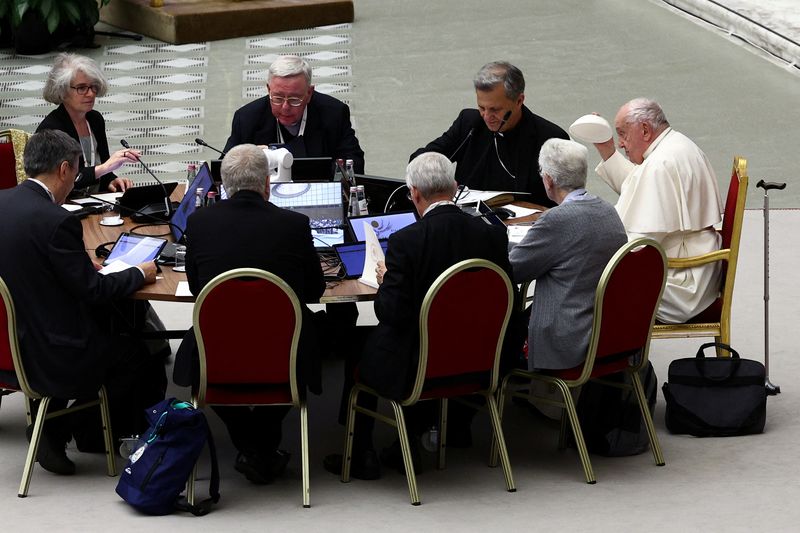By Joshua McElwee
VATICAN CITY (Reuters) - Advocates for a greater role for women in the Catholic Church say Pope Francis is failing their cause at a global meeting of Church leaders drawing to a close this week, by shunting aside the question of finally letting women be ordained as clergy.
Women's roles in the Church have been hotly debated on the sidelines during the Synod of Bishops, the second of two month-long Vatican summits being held a year apart following an unprecedented two-year canvassing of opinions of Catholics across the world.
At the first synod a year ago, members said it was "urgent" for the global Church to better include women in decision-making roles. Francis has taken some steps to promote women to positions previously held only by men, including letting nearly 60 women serve among the 368 voting members at this synod.
But advocates say Francis has taken the issue of women clergy off the table at the synod, by asking the Vatican's typically conservative doctrinal office to take over study of whether women can be ordained as deacons.
"What [Francis] has done so far to improve the condition of women in the Church has only been for appearance's sake," said Lucetta Scaraffia, an Italian journalist who edited a monthly women's magazine published by the Vatican's newspaper for seven years.
"It's useless for women to wait for 'the good pope' who will recognise their true value," she said.
The Catholic Church has an all-male clergy, and Pope John Paul II declared it had no authority to ordain women as priests. But church historians say there is evidence that in earlier centuries women served as deacons - ordained ministers who, unlike priests, cannot celebrate the Mass.
Francis, 87, has already created two previous Vatican commissions to consider ordaining women as deacons, but has not moved forward on it. The issue is one of 10 subjects that he removed from the synod's considerations and assigned to study groups to report to him next June.
'NOTHING LEFT TO STUDY'
Cardinal Victor Fernandez, the Church's lead doctrine official, told the summit on Oct. 2 that "there is still no room for a positive decision" regarding women deacons.
Fernandez's comments "caused strong distress inside and outside the synod hall", said Marinella Perroni, a widely respected Italian theologian.
She compared the Church's stance now to a decision by Pope Paul VI not to move forward on women clergy in the 1970s, despite a report then from the Vatican's biblical commission that scripture did not prohibit female ministers.
"History repeats itself," said Perroni, a founder of the Committee of Italian Women Theologians. "There is nothing left to study."
Last month the pope was accused of using outdated language about women during a visit to a Catholic university in Belgium, when he defined a woman as "a daughter, a sister, a mother". Women offer "a fertile welcome, care (and) vital devotion" making them more important than men, he said.
In a highly unusual move, the university issued a statement moments after the pope's visit, expressing its "incomprehension and disapproval" of his views. Francis criticised the university's statement, saying it had been written in advance and was "not moral".
The trip highlighted the pope's "refusal to understand and listen to women," said Scaraffia.
Austen Ivereigh, a British author who has written two biographies of Francis and co-wrote a book with him, said the pope thinks there is "an assumption in the Western world that on the question of women there's been this huge advance, and that the Catholic Church is being left behind."

"I don't think he accepts that," said Ivereigh.
The 2024 synod assembly is scheduled to vote on its final document on Oct. 26. The pope will then decide whether to issue his own text, with possible doctrinal changes, but probably only after receiving the study group reports in mid-2025.